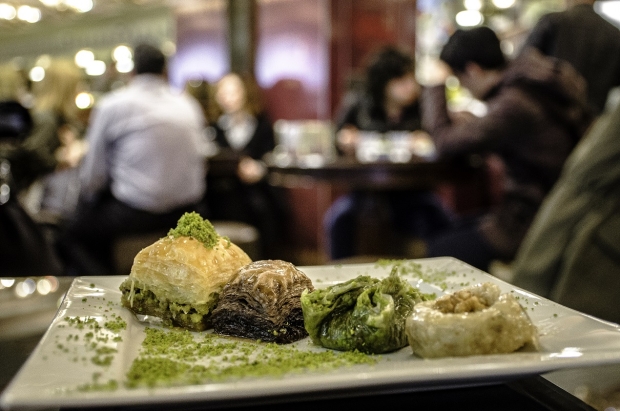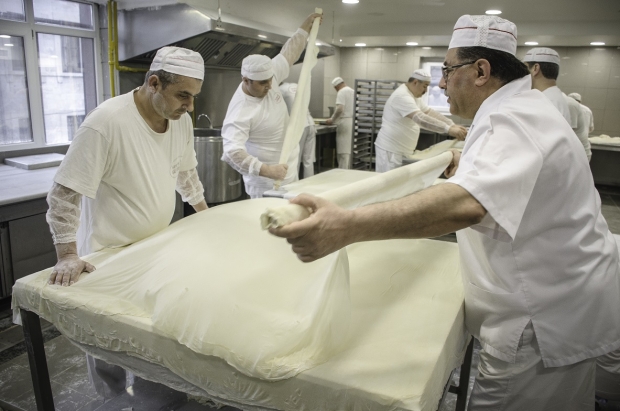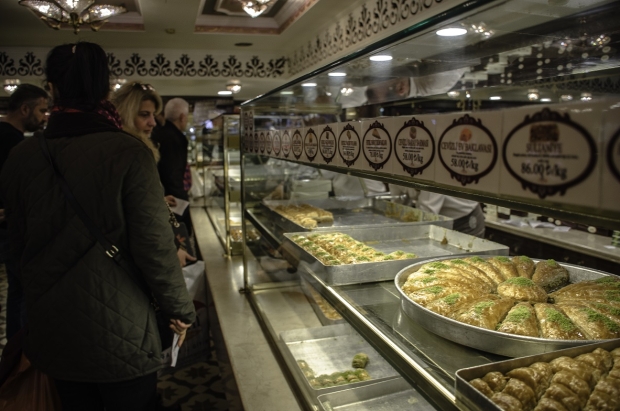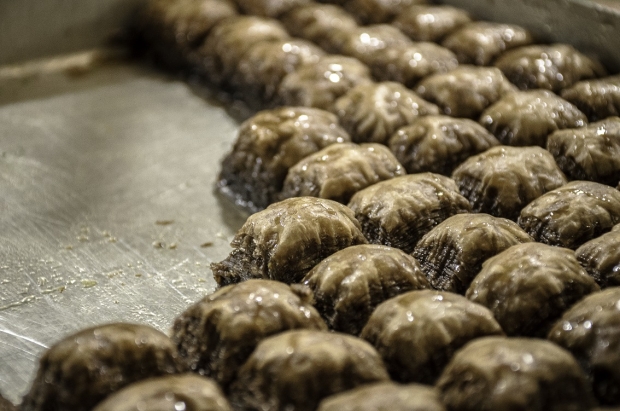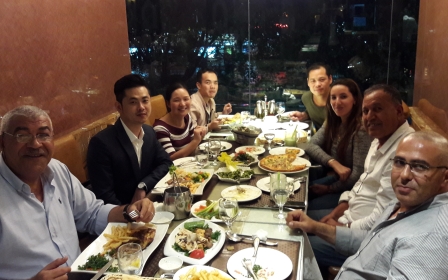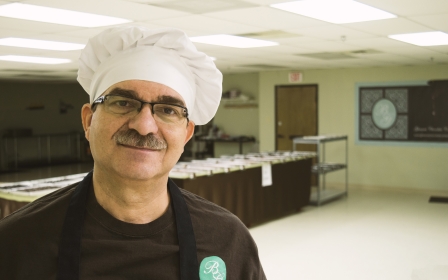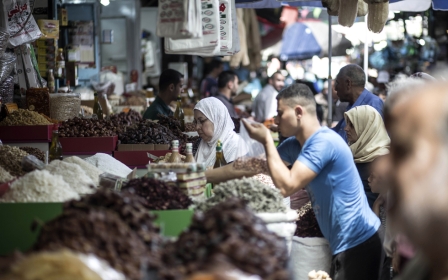In the lab of Istanbul's baklava master: 'The stomach never lies'
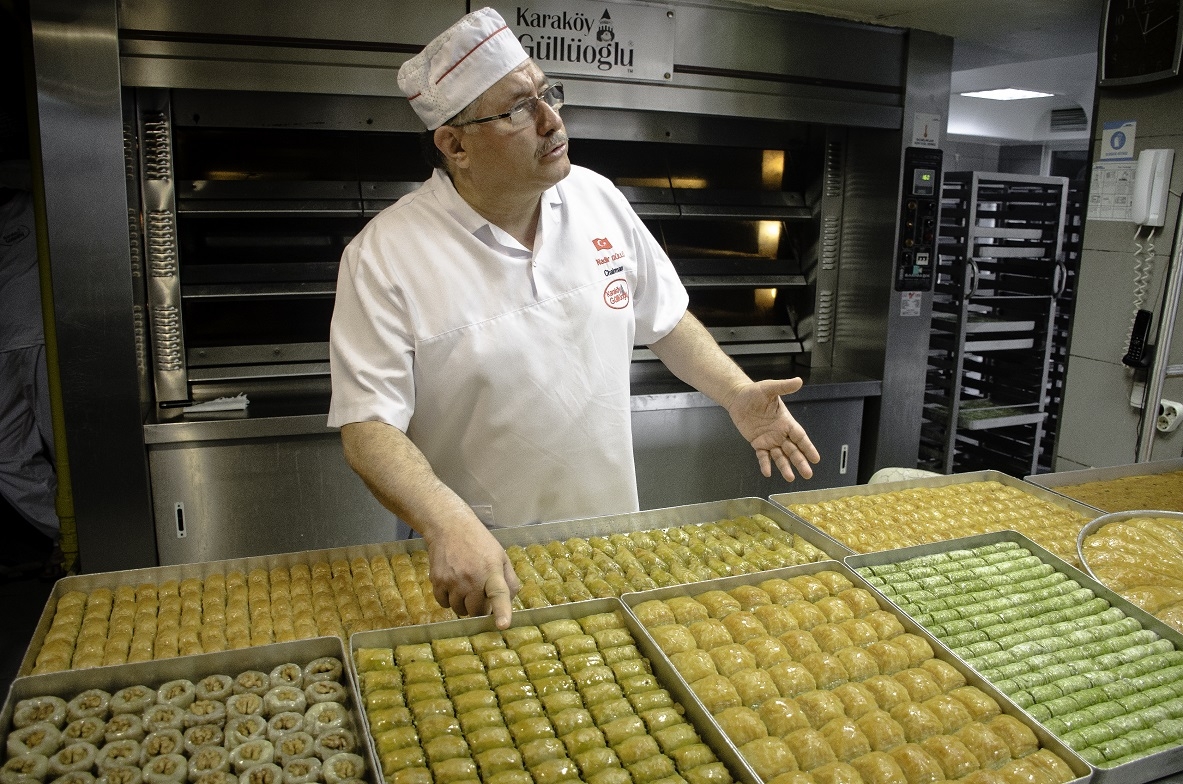
ISTANBUL, Turkey - Some may say that Nadir Gullu is a food tyrant, but there is no doubt that his perfectionism and authoritarian approach have made him into the master baklava maker that he is today. Known in Turkey as baklavaci, his baklava is among the best in Turkey.
Although he is not as tough on his employees as the Ottoman Sultans were believed to have been with their servants, he runs his baklava business like a despot.
There is no room for debate as to how his crispy delights are not just random sweets, but something deeply rooted in tradition.
“We don’t make dessert, we make baklava," insists the fifth generation in a line of baklavaci, describing Baklava as "the sultan of meals".
'We don’t make dessert, we make baklava'
- Nadir Gullu, Baklavaci
The family business was founded in 1820 in the southeastern city of Gaziantep by his forefather, which is not far from the Syrian city of Aleppo. His predecessor discovered the art of baklava in Syria while on a pilgrimage to Mecca.
Since then, the business has grown to employ 160 people. “We only have one shop. It is a guarantee of quality,” says Gullu.
Respect for the flag and masters
Gullu's 40-year career has been marked by dozens of prizes, medals and trophies that he proudly displays in his office. While sitting next to a TV screen broadcasting a loop of footage showcasing his work, Gullu describes how “cooks and students come here from all over the world to learn how to make real baklava”.
'We don't teach the job to apprentices who are not respectful to their flag, to their nation or to their baklavaci masters'
- Nadir Gullu, Baklavaci
The baklavaci claims that he is one of the last few masters perpetuating the “real tradition” of baklava making, although he has successfully adapted it to Turkey’s modern tastes.
“We don't teach the job to apprentices who are not respectful to their flag, to their nation or to their [baklavaci] masters,” he repeats constantly.
As a result of his hard work, international appreciation has been achieved, with heads of state such as "Obama, Erdogan, Gul, King Abdullah [and] Putin" as customers, according to his claims. In January 2016, Jill Biden, wife of US Vice President Joe Biden, paid a visit to Gullu’s shop, leaving with 40 kilos of baklava.
The devil is in the details
The five-storey factory where the baklava is produced is a block away from the shop. Looking more like a laboratory than the lair of baklava masters, its interior walls are lined with polished tiles that are constantly being cleaned.
Hygiene is a top priority and neither staff nor visitors can enter the premises without a lab coat or a hairnet. For the viewing pleasure of baklava enthusiasts, part of each room is lined with glass panels, allowing guests to watch the process.
Gullu rarely stays out of the production spaces; every detail is micromanaged.
“To make good baklava, the master has to check every single step. If one worker makes one mistake, the whole the process is over,” he explains while wearing a white coat and hat.
The production rhythm is rapid. Employees work eight hours a day and no mistakes or delays are tolerated.
Gullu even has an opinion on how much sleep his employees should have. “The job is exhausting. They should sleep two hours for every two hours they work."
In a section of the workshop, workers covered in wheat flour prepare the dough that is vigorously rolled onto marble tables. Then it is kneaded until it is thin enough to move to the next room where the actual baking takes place.
"Each sheet of yukfa [dough] has to be thinner than 0.1 millimetre," he says before tossing a coin from his pocket. “If the coin cuts through the dough, it means the dough is thin enough."
In the book Sherbert and Spice: The Complete Story of Turkish Sweets, Mary Isin writes that the best baklava made at the Sultan’s palace was “so unsubstantial that a coin dropped from a height of an arsin (65 centimetres) would pierce every one of its layers and strike the bottom of the baking tray”.
'It takes a full year for an apprentice to learn how to make a proper sheet of dough and 10 to become a baklavaci'
- Nadir Gullu, Baklavaci
Gullu also tests the transparency of the dough, making visitors read signs through it.
“It takes a full year for an apprentice to learn how to make a proper sheet of dough,” he says, and 10 years to become a baklavaçi.
Tons of baklava
To make one tray of baklava, 40 layers of yukfa are needed and the process must be swift in order to prevent the dough from drying out. After the first twenty layers are laid out, nuts like pistachios, walnuts or almonds are spread over the dough which is then covered with other layers and topped by a perfect yukfa.
'My son came [to me] with the idea of baklava-burgers'
- Nadir Gullu, baklavaci
The baklava at this point is ready to be sliced and covered in liquid butter, which has been heated to 55°C, giving it its glistening look. To bake full trays of around a hundred baklava, the entire baking process takes about four hours.
All of the ingredients are carefully selected to be the best. The pistachios are from Gaziantep; the nuts are from Turkey's northern province of Tokat; the butter from the southern Anatolian hills, and the sugar is made from beets. The quality is in fact reflected in the price.
“It’s impossible to have good baklava for less than 60 TL ($16) per kilo,” Gullu says.
Yet the quality-control is a process that never ends. “The quality of baklava has increased because we control the ingredients more,” explains Taylon Akgan, a food engineer working for the company.
When the time comes for Gullu to pour the boiling, sizzling and bubbling syrup over the baklava, his joy is palpable.
“Smell and listen,” he says, while holding a dripping ladle over the tray.
On a given day, Gullu’s workshop produces one to two tons of baklava and sweets daily. In 2016, Baktad, an Istanbul-based association of dessert makers, said that Turkey produced 950 tons of baklava per day.
Thousand of customers
Family legend has it that Mustafa Gullu, Nadir Gullu’s father, reintroduced the golden and green delights in the Istanbul neighbourhood of Karakoy where their fame had faded.
“It used to be a luxury product, only affordable for a few people,” recalls Muhsin Ozkan, who has been working for the Gullu family since the age of 16, 57 years.
According to Ozkan, Mustafa already had a deep sense of marketing in the early days. He would offer baklava samples at the piers where ferries and cruise ships would dock, and was already proposing free delivery in the 1950’s.
To get return customers, Ozkan said he used to put a photo of the shop in the boxes so people could find the address.
“On weekends and holidays we can have up to 10,000 customers,” says Ozkan.
According to Baktad, Turks eat an average 4.4kg of baklava annually. But as the number of customers increases, the diversity of demands has been increasing as well.
“They ask for lighter baklava, less butter, more choices," says Ozkan.
Science meets tradition
“We have margins for adaptation,” agrees Gullu, pointing out there are many different kinds of baklava. "We usually serve around twenty sorts," he added.
'We try to combine science and tradition'
- Taylon Akgan, Food engineer
Twenty years ago, Gullo started selling baklava for diabetics, replacing the sugary syrup with a natural sweetener. The shop has also been selling gluten-free baklava and even proposes special sweets that are supposedly "quite good for people with cardiovascular disease".
"We try to combine science and tradition," says Akgan.
And modern taste is not missing from the newest creations to hit Karakoy Gulluoglu.
"My son came [to me] with the idea of baklava-burgers," says Gullu, which turned into a large round baklava stuffed with kaymak (clotted cream).
Customers can also taste chocolate baklava and carrot-baklava. In terms of the packaging and services, Gullu’s shop has combined 19th-century style with modern signage. Signs are in Turkish, Arabic and English and international customers can order baklava online.
Chew twice
The baklavaci insists on the importance of knowing how to savour the baklava, as its appreciation mobilises all five senses, according to Gullu.
This entails listening to the baklava carefully. As the fragrance is revealed through the air, the butter visually delights in the crispness that emphasises the green of the pistachios or the brown of the nuts. This is a complex structure that the taster must contemplate before taking a bite.
The sound should be a clear but smooth crunch. It is only then, when all the other senses are on fire, that the palette will discover the symphony of tastes.
Gullu advises to chew twice and not forget to breathe, so all the flavours deploy themselves. "The final test will take place after two hours. Our stomachs never lie about quality," says Gullu.
This article is available in French on Middle East Eye French edition.
New MEE newsletter: Jerusalem Dispatch
Sign up to get the latest insights and analysis on Israel-Palestine, alongside Turkey Unpacked and other MEE newsletters
Middle East Eye delivers independent and unrivalled coverage and analysis of the Middle East, North Africa and beyond. To learn more about republishing this content and the associated fees, please fill out this form. More about MEE can be found here.


